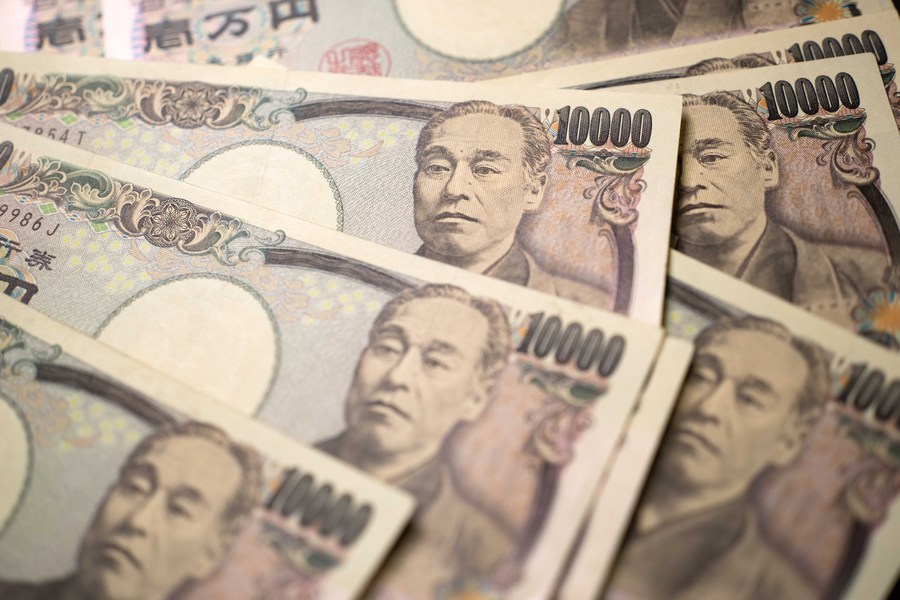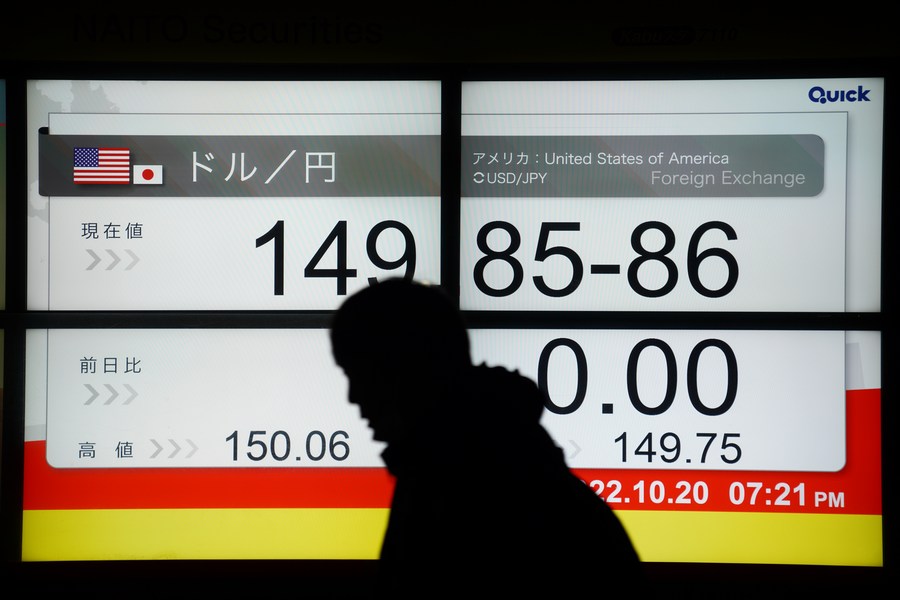
Photo taken on April 20, 2022 shows the Japanese yen in Tokyo, Japan. (Xinhua/Zhang Xiaoyu)
The yen will gradually strengthen against the dollar this year and reach a 129 yen-dollar level by the end of the year, according to forecasts by Japan's Sumitomo Mitsui DS Asset Management.
TOKYO, Jan. 15 (Xinhua) -- As the new year starts, the Japanese yen is closely watched by global financial markets with local institutions predicting that the currency's strength against the U.S. dollar might gradually pick up pace this year.
In 2022, big losses in the yen's exchange rate shocked the Japanese economy, with the currency once falling by more than 30 percent against the U.S. dollar.
Yen's depreciation in 2022 was caused by multiple aggressive rate hikes of the U.S. Federal Reserve since the beginning of last year, which also pushed the dollar up against other currencies. In late October 2022, the yen-dollar exchange rate in Tokyo's foreign exchange market plunged below 150, the lowest level since August 1990.
The United States adopted a tight monetary policy in response to high domestic inflation, triggering many central banks to follow up with interest rate hikes, according to a report released by Japan's largest bank MUFG Bank.
However, the Bank of Japan (BOJ), or Japan's central bank, was forced to stick to the ultra-loose monetary policy due to weak domestic demand and sluggish economic recovery, according to the report.
Amid surging energy costs, Japan's wholesale prices rose for the 21st straight month to hit the highest level in November, with the corporate goods price index rising 9.3 percent from a year earlier to 118.5, central bank data showed.
Analysts believed that the weaker yen amplified the negative impact of high international energy prices on the Japanese economy.
Hidetoshi Tashiro, chief economist at Japan's Sigma Capital Ltd., said with the country being a big importer, the rapid weakening of the yen sharply pushes up the operating costs of enterprises.
"However, it is difficult for enterprises to pass on higher costs downstream through price increases, with many of which squeezing the operating space of most firms and small businesses facing the risk of bankruptcy," he said.

An electronic display shows a real-time exchange rate of the Japanese yen against the U.S. dollar in Tokyo, Japan, Oct. 20, 2022. (Xinhua/Zhang Xiaoyu)
A report by corporate database Teikoku Databank showed that 21 bankruptcies reported during the first 10 months in 2022 were caused by yen's depreciation, with 19 reported from August to October.
For the whole year of 2022, the number of Japanese business failures due to yen's depreciation is likely to surpass 22 reported in 2019, reaching the highest level in five years, according to Teikoku Databank.
While the impact of the sharp depreciation on the Japanese economy continues, the yen's trend in the new year is closely watched around the world.
After a monetary policy meeting on Dec. 20, 2022, the BOJ announced a shift in its ultra-loose monetary policy, raising the yield on the 10-year Japanese government bond as high as 0.5 percent from a previous cap of 0.25 percent.
Following the decision, the yield on newly issued 10-year government bonds, seen as an indicator of long-term interest rates, briefly spiked in the Japanese bond market.
In 2023, the trajectory of the yen will be determined by the monetary policies of the U.S. Federal Reserve and the BOJ, noted a report released by Japan's Sumitomo Mitsui DS Asset Management.
The yen will gradually strengthen against the dollar this year and reach a 129 yen-dollar level by the end of the year, according to the report's forecasts.
Meiji Yasuda Research Institute, a local think tank, predicted that the yen-dollar exchange rate will climb amid fluctuations.
The U.S. long-term aggressive monetary tightening policy risks tipping the country's economy into recession, at which point financial markets' expectations of gradual Fed rate cuts would prevail, said the think tank.
Meanwhile, the BOJ is likely to revise its monetary easing policy further this year, it added.■












